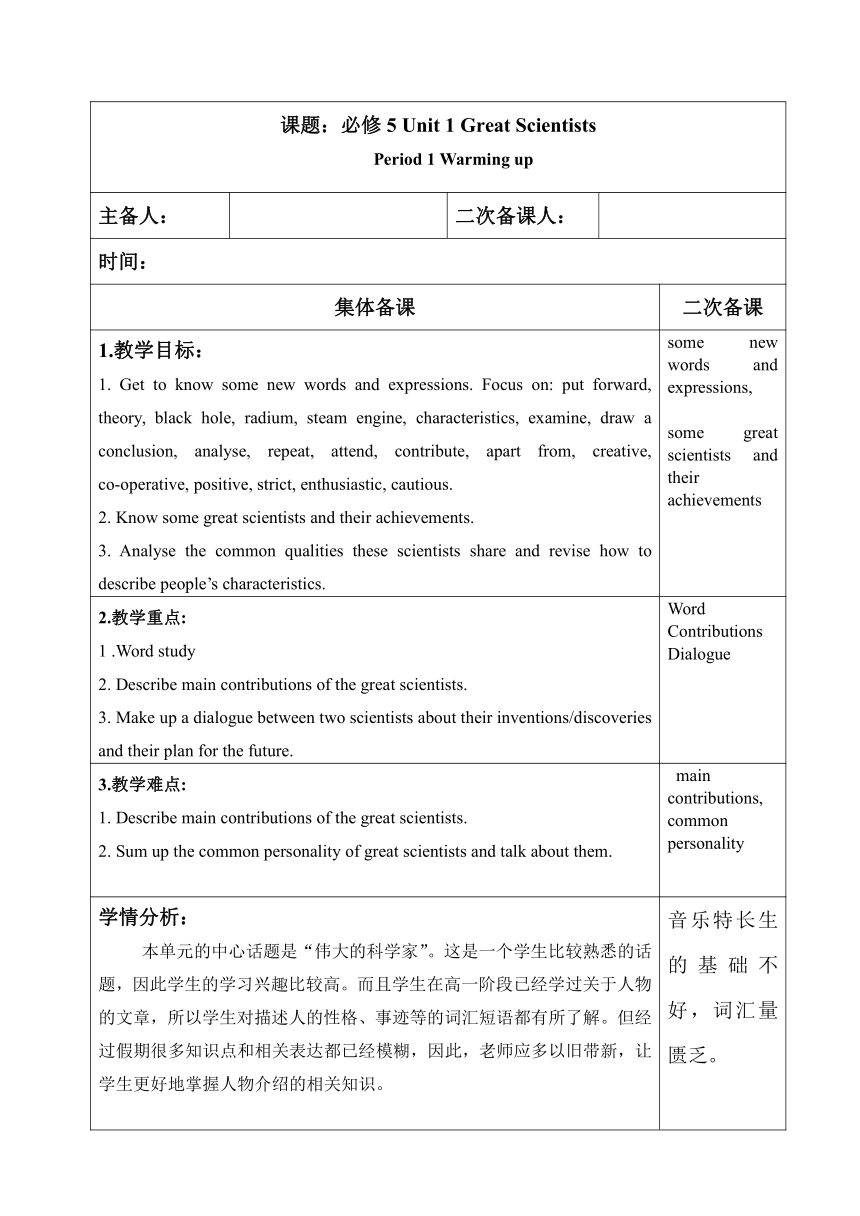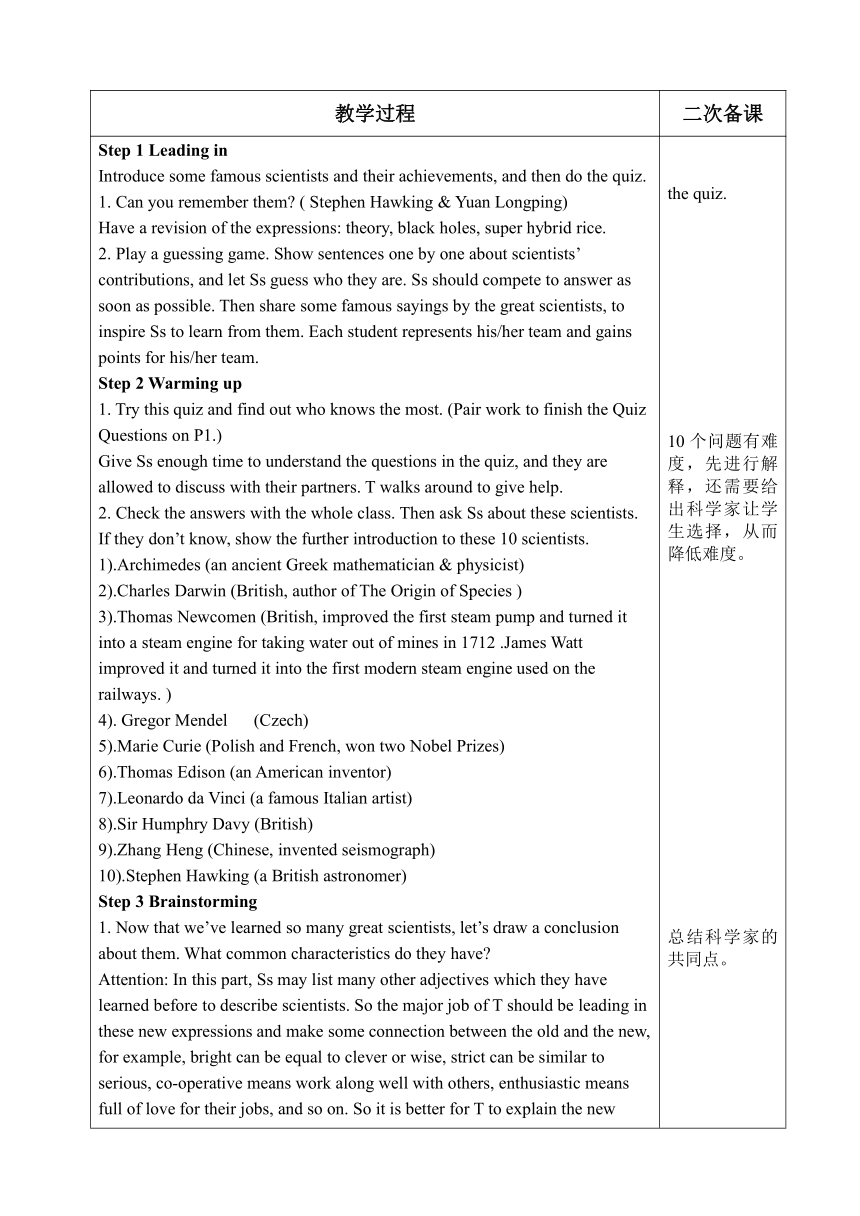人教高中英语必修5 Unit 1 Great Scientists-period-1教案
文档属性
| 名称 | 人教高中英语必修5 Unit 1 Great Scientists-period-1教案 |

|
|
| 格式 | zip | ||
| 文件大小 | 18.8KB | ||
| 资源类型 | 教案 | ||
| 版本资源 | 人教版(新课程标准) | ||
| 科目 | 英语 | ||
| 更新时间 | 2020-08-31 00:00:00 | ||
图片预览


文档简介
课题:必修5
Unit
1
Great
Scientists
Period
1
Warming
up
主备人:
二次备课人:
时间:
集体备课
二次备课
1.教学目标:
1.
Get
to
know
some
new
words
and
expressions.
Focus
on:
put
forward,
theory,
black
hole,
radium,
steam
engine,
characteristics,
examine,
draw
a
conclusion,
analyse,
repeat,
attend,
contribute,
apart
from,
creative,
co-operative,
positive,
strict,
enthusiastic,
cautious.
2.
Know
some
great
scientists
and
their
achievements.
3.
Analyse
the
common
qualities
these
scientists
share
and
revise
how
to
describe
people’s
characteristics.
some
new
words
and
expressions,
some
great
scientists
and
their
achievements
2.教学重点:
1
.Word
study
2.
Describe
main
contributions
of
the
great
scientists.
3.
Make
up
a
dialogue
between
two
scientists
about
their
inventions/discoveries
and
their
plan
for
the
future.
Word
Contributions
Dialogue
3.教学难点:
1.
Describe
main
contributions
of
the
great
scientists.
2.
Sum
up
the
common
personality
of
great
scientists
and
talk
about
them.
main
contributions,
common
personality
学情分析:
本单元的中心话题是“伟大的科学家”。这是一个学生比较熟悉的话题,因此学生的学习兴趣比较高。而且学生在高一阶段已经学过关于人物的文章,所以学生对描述人的性格、事迹等的词汇短语都有所了解。但经过假期很多知识点和相关表达都已经模糊,因此,老师应多以旧带新,让学生更好地掌握人物介绍的相关知识。
音乐特长生的基础不好,词汇量匮乏。
教学过程
二次备课
Step
1
Leading
in
Introduce
some
famous
scientists
and
their
achievements,
and
then
do
the
quiz.
1.
Can
you
remember
them?
(
Stephen
Hawking
&
Yuan
Longping)
Have
a
revision
of
the
expressions:
theory,
black
holes,
super
hybrid
rice.
2.
Play
a
guessing
game.
Show
sentences
one
by
one
about
scientists’
contributions,
and
let
Ss
guess
who
they
are.
Ss
should
compete
to
answer
as
soon
as
possible.
Then
share
some
famous
sayings
by
the
great
scientists,
to
inspire
Ss
to
learn
from
them.
Each
student
represents
his/her
team
and
gains
points
for
his/her
team.
Step
2
Warming
up
1.
Try
this
quiz
and
find
out
who
knows
the
most.
(Pair
work
to
finish
the
Quiz
Questions
on
P1.)
Give
Ss
enough
time
to
understand
the
questions
in
the
quiz,
and
they
are
allowed
to
discuss
with
their
partners.
T
walks
around
to
give
help.
2.
Check
the
answers
with
the
whole
class.
Then
ask
Ss
about
these
scientists.
If
they
don’t
know,
show
the
further
introduction
to
these
10
scientists.
1).Archimedes
(an
ancient
Greek
mathematician
&
physicist)
2).Charles
Darwin
(British,
author
of
The
Origin
of
Species
)
3).Thomas
Newcomen
(British,
improved
the
first
steam
pump
and
turned
it
into
a
steam
engine
for
taking
water
out
of
mines
in
1712
.James
Watt
improved
it
and
turned
it
into
the
first
modern
steam
engine
used
on
the
railways.
)
4).
Gregor
Mendel
(Czech)
5).Marie
Curie
(Polish
and
French,
won
two
Nobel
Prizes)
6).Thomas
Edison
(an
American
inventor)
7).Leonardo
da
Vinci
(a
famous
Italian
artist)
8).Sir
Humphry
Davy
(British)
9).Zhang
Heng
(Chinese,
invented
seismograph)
10).Stephen
Hawking
(a
British
astronomer)
Step
3
Brainstorming
1.
Now
that
we’ve
learned
so
many
great
scientists,
let’s
draw
a
conclusion
about
them.
What
common
characteristics
do
they
have?
Attention:
In
this
part,
Ss
may
list
many
other
adjectives
which
they
have
learned
before
to
describe
scientists.
So
the
major
job
of
T
should
be
leading
in
these
new
expressions
and
make
some
connection
between
the
old
and
the
new,
for
example,
bright
can
be
equal
to
clever
or
wise,
strict
can
be
similar
to
serious,
co-operative
means
work
along
well
with
others,
enthusiastic
means
full
of
love
for
their
jobs,
and
so
on.
So
it
is
better
for
T
to
explain
the
new
words
in
English-English
way.
But
if
the
Ss
are
not
so
good
at
English,
T
can
use
some
Chinese
if
necessary.
2.
Draw
a
conclusion
about
them
in
sentences:
They
all…
E.g.
made
a
great
contribution
made
great
achievements
succeeded
in
their
scientific
career
overcome
many
difficulties
Step
4
Pair
work
Make
up
dialogues.
It’s
a
pity
that
these
great
minds
can’t
get
together.
So
now
we’ll
organize
a
party
for
them.
Because
of
an
advanced
machine
called
Time
Machine,
all
scientists
from
all
different
times
can
come
to
attend
it.
Now
they’re
talking
to
each
other.
Make
up
a
dialogue
between
two
scientists.
They
may
talk
about
their
achievements,
their
life
and
their
plan
for
the
future
work.
They
may
talk
about
these
1.I
wonder
if
you’re…
2.I
know
you
because
I’ve
heard
that
you…
3.Thank
you
for
knowing
so
much
about
me.
4.I’m
the
one
who…
5.I’m
really
interested
in
your
invention.
……
They
may
ask
about
these
What’s
your
nationality?
(I’m
from…)
What
are
you
interested
in?
What
conclusion
have
you
drawn?
What
are
you
proud
of?
What
leads
to
your
success?
(My
cautiousness/
creativeness/
determination…leads
to…)
the
quiz.
10个问题有难度,先进行解释,还需要给出科学家让学生选择,从而降低难度。
总结科学家的共同点。
提供科学家共同点的例子。
Make
up
dialogues,
并提供例子,降低难度。
分层作业:
必做:Revise
the
new
words
and
expressions
learned
in
this
lesson,
and
preview
those
of
the
reading
text.
选做:Tell
your
partner
about
the
great
scientists
and
their
achievements.
Revise,
preview
教学反思(教学后记):
导入部分学生能说出一些伟大的科学家及其伟大的贡献,能顺利地完成guessing
game;quiz部分的10个描述学生能看懂的为数不多,需要做比较详细的讲解,讲解完后学生基本能想出相匹配的科学家;brainstorming部分的总结从单一的单词到句子的过度,任务从简单到复杂,从容易到困难,遵循循序渐进的学习规律;最后的pairwork属于语言的输出,学生在前面足够的语言输入的情况下,能结合屏幕上给出的句型进行对话练习。
Unit
1
Great
Scientists
Period
1
Warming
up
主备人:
二次备课人:
时间:
集体备课
二次备课
1.教学目标:
1.
Get
to
know
some
new
words
and
expressions.
Focus
on:
put
forward,
theory,
black
hole,
radium,
steam
engine,
characteristics,
examine,
draw
a
conclusion,
analyse,
repeat,
attend,
contribute,
apart
from,
creative,
co-operative,
positive,
strict,
enthusiastic,
cautious.
2.
Know
some
great
scientists
and
their
achievements.
3.
Analyse
the
common
qualities
these
scientists
share
and
revise
how
to
describe
people’s
characteristics.
some
new
words
and
expressions,
some
great
scientists
and
their
achievements
2.教学重点:
1
.Word
study
2.
Describe
main
contributions
of
the
great
scientists.
3.
Make
up
a
dialogue
between
two
scientists
about
their
inventions/discoveries
and
their
plan
for
the
future.
Word
Contributions
Dialogue
3.教学难点:
1.
Describe
main
contributions
of
the
great
scientists.
2.
Sum
up
the
common
personality
of
great
scientists
and
talk
about
them.
main
contributions,
common
personality
学情分析:
本单元的中心话题是“伟大的科学家”。这是一个学生比较熟悉的话题,因此学生的学习兴趣比较高。而且学生在高一阶段已经学过关于人物的文章,所以学生对描述人的性格、事迹等的词汇短语都有所了解。但经过假期很多知识点和相关表达都已经模糊,因此,老师应多以旧带新,让学生更好地掌握人物介绍的相关知识。
音乐特长生的基础不好,词汇量匮乏。
教学过程
二次备课
Step
1
Leading
in
Introduce
some
famous
scientists
and
their
achievements,
and
then
do
the
quiz.
1.
Can
you
remember
them?
(
Stephen
Hawking
&
Yuan
Longping)
Have
a
revision
of
the
expressions:
theory,
black
holes,
super
hybrid
rice.
2.
Play
a
guessing
game.
Show
sentences
one
by
one
about
scientists’
contributions,
and
let
Ss
guess
who
they
are.
Ss
should
compete
to
answer
as
soon
as
possible.
Then
share
some
famous
sayings
by
the
great
scientists,
to
inspire
Ss
to
learn
from
them.
Each
student
represents
his/her
team
and
gains
points
for
his/her
team.
Step
2
Warming
up
1.
Try
this
quiz
and
find
out
who
knows
the
most.
(Pair
work
to
finish
the
Quiz
Questions
on
P1.)
Give
Ss
enough
time
to
understand
the
questions
in
the
quiz,
and
they
are
allowed
to
discuss
with
their
partners.
T
walks
around
to
give
help.
2.
Check
the
answers
with
the
whole
class.
Then
ask
Ss
about
these
scientists.
If
they
don’t
know,
show
the
further
introduction
to
these
10
scientists.
1).Archimedes
(an
ancient
Greek
mathematician
&
physicist)
2).Charles
Darwin
(British,
author
of
The
Origin
of
Species
)
3).Thomas
Newcomen
(British,
improved
the
first
steam
pump
and
turned
it
into
a
steam
engine
for
taking
water
out
of
mines
in
1712
.James
Watt
improved
it
and
turned
it
into
the
first
modern
steam
engine
used
on
the
railways.
)
4).
Gregor
Mendel
(Czech)
5).Marie
Curie
(Polish
and
French,
won
two
Nobel
Prizes)
6).Thomas
Edison
(an
American
inventor)
7).Leonardo
da
Vinci
(a
famous
Italian
artist)
8).Sir
Humphry
Davy
(British)
9).Zhang
Heng
(Chinese,
invented
seismograph)
10).Stephen
Hawking
(a
British
astronomer)
Step
3
Brainstorming
1.
Now
that
we’ve
learned
so
many
great
scientists,
let’s
draw
a
conclusion
about
them.
What
common
characteristics
do
they
have?
Attention:
In
this
part,
Ss
may
list
many
other
adjectives
which
they
have
learned
before
to
describe
scientists.
So
the
major
job
of
T
should
be
leading
in
these
new
expressions
and
make
some
connection
between
the
old
and
the
new,
for
example,
bright
can
be
equal
to
clever
or
wise,
strict
can
be
similar
to
serious,
co-operative
means
work
along
well
with
others,
enthusiastic
means
full
of
love
for
their
jobs,
and
so
on.
So
it
is
better
for
T
to
explain
the
new
words
in
English-English
way.
But
if
the
Ss
are
not
so
good
at
English,
T
can
use
some
Chinese
if
necessary.
2.
Draw
a
conclusion
about
them
in
sentences:
They
all…
E.g.
made
a
great
contribution
made
great
achievements
succeeded
in
their
scientific
career
overcome
many
difficulties
Step
4
Pair
work
Make
up
dialogues.
It’s
a
pity
that
these
great
minds
can’t
get
together.
So
now
we’ll
organize
a
party
for
them.
Because
of
an
advanced
machine
called
Time
Machine,
all
scientists
from
all
different
times
can
come
to
attend
it.
Now
they’re
talking
to
each
other.
Make
up
a
dialogue
between
two
scientists.
They
may
talk
about
their
achievements,
their
life
and
their
plan
for
the
future
work.
They
may
talk
about
these
1.I
wonder
if
you’re…
2.I
know
you
because
I’ve
heard
that
you…
3.Thank
you
for
knowing
so
much
about
me.
4.I’m
the
one
who…
5.I’m
really
interested
in
your
invention.
……
They
may
ask
about
these
What’s
your
nationality?
(I’m
from…)
What
are
you
interested
in?
What
conclusion
have
you
drawn?
What
are
you
proud
of?
What
leads
to
your
success?
(My
cautiousness/
creativeness/
determination…leads
to…)
the
quiz.
10个问题有难度,先进行解释,还需要给出科学家让学生选择,从而降低难度。
总结科学家的共同点。
提供科学家共同点的例子。
Make
up
dialogues,
并提供例子,降低难度。
分层作业:
必做:Revise
the
new
words
and
expressions
learned
in
this
lesson,
and
preview
those
of
the
reading
text.
选做:Tell
your
partner
about
the
great
scientists
and
their
achievements.
Revise,
preview
教学反思(教学后记):
导入部分学生能说出一些伟大的科学家及其伟大的贡献,能顺利地完成guessing
game;quiz部分的10个描述学生能看懂的为数不多,需要做比较详细的讲解,讲解完后学生基本能想出相匹配的科学家;brainstorming部分的总结从单一的单词到句子的过度,任务从简单到复杂,从容易到困难,遵循循序渐进的学习规律;最后的pairwork属于语言的输出,学生在前面足够的语言输入的情况下,能结合屏幕上给出的句型进行对话练习。
